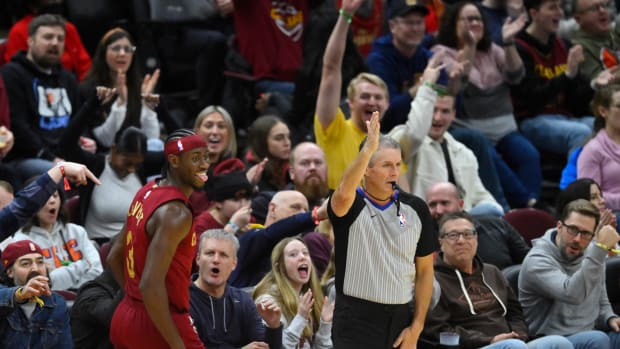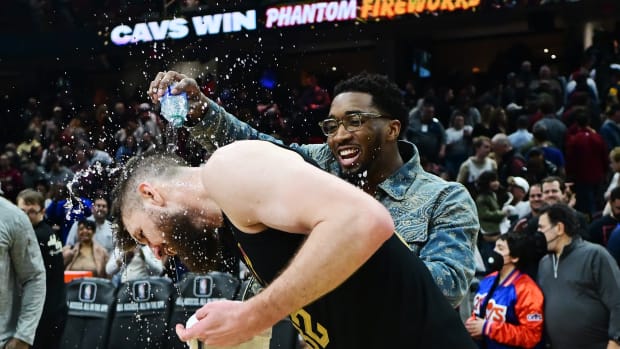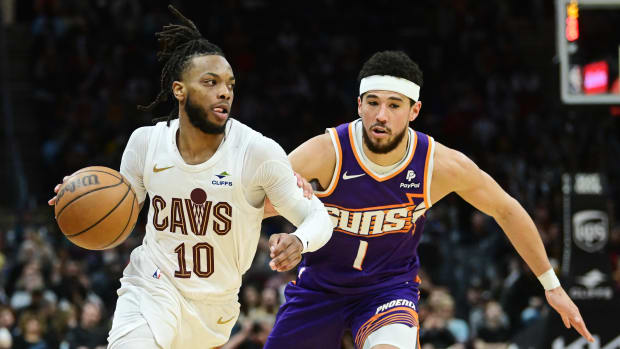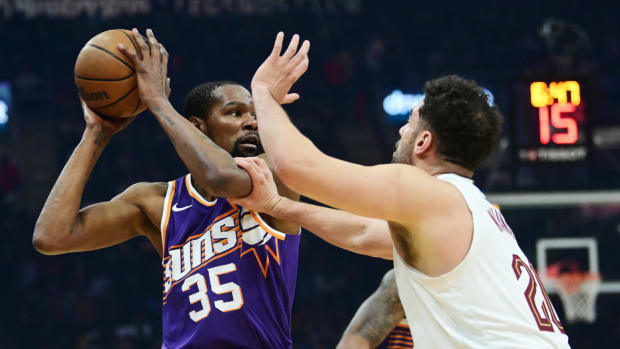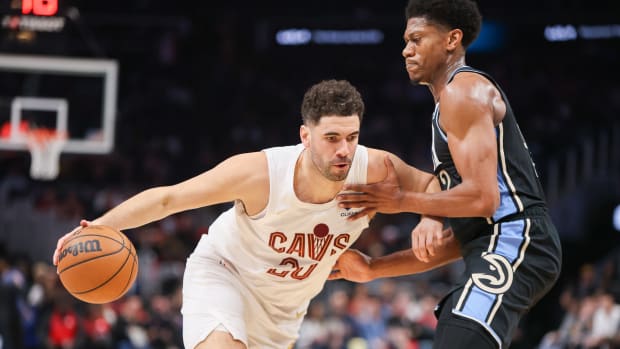Roth: Examining Lakers’ salary situation and odds to land a star
Ever since Kobe Bryant retired in 2016 (and to some degree, even before Bryant’s retirement), the Los Angeles Lakers have been in rebuild mode. Make no mistake, the Lakers are one of the most successful franchises in NBA history for a reason – the organization’s moves are very methodical and calculated on every front, including with respect to their front office.
For that reason, it wasn’t surprising when the Lakers hired Magic Johnson as president of basketball operations and Bryant’s longtime agent, Rob Pelinka, as the GM of the organization in 2017. Pelinka has extensive knowledge and experience with the NBA salary cap, and Magic knows a thing or two about basketball and winning (it’s not like he is a 5-time NBA champion, 3-time NBA Finals MVP, 3-time NBA MVP and a 12-time NBA All-Star).
From Day 1, Pelinka and Magic have had their sights set on the 2018 free-agency period and have been relentless in setting up the organization to make some major moves. As a result, the Lakers are in perhaps one of the best situation heading into the start of free agency on July 1.
The current position
The Lakers have a total of $39,143,365 in salaries committed to the 2018-19 season. While that amount is well below the $101 million salary cap projected for the upcoming season, the Lakers, as of this moment, will be over the cap because of a whopping $98,572,731 in cap holds.
The cap holds are made up of the organization’s seven free agents ($97,025,901) and a hold for their first-round pick, Moe Wagner, of $1,546,830 (Wagner’s amount is based upon the assumption that the Salary Cap will increase a total of 2.02 percent from the 2017-18 season). As with the Philadelphia 76ers, since the Lakers will be over the cap, unless the team renounces their free agents, they will only be able to sign players using exceptions and league minimum salaries once free agency starts. Unlike the 76ers, however, the composition of the Lakers' team salary provides the organization with a significant amount of options and flexibility.
The goal
Ideally, the Los Angeles Lakers would like to sign at least two superstars. The primary target, as is with every other team in the NBA, is LeBron James. The other main targets are Paul George and Chris Paul.
Unfortunately for the Lakers, unless George, Paul, or James is willing to take a significant pay cut, or at the very least, be willing to forego a salary bump, it’s going to be very difficult for the organization to land all three of them. Remember, if LeBron signs as a free agent with a new team, the maximum amount he can receive for his first-year salary is $35,350,000 (based on the projected 2018-19 salary cap of $101 million).
The maximum amount Paul can receive for his first-year salary if he signs as a free agent with a new team is also $35,350,000. George’s maximum first-year salary if signs with a new team as a free agent is a little lower at $30,300,000 (again, based on the projected 2018-19 salary cap).
Thus, if James, George and Paul all signed contracts as free agents with the Lakers containing first-year salaries at the maximum amount each is eligible to earn, it would cost the Lakers a total of $101,000,000 (the entire projected salary-cap amount for the upcoming season). Even if the Lakers renounce all of their free agents (dropping them well below the salary-cap), the team will still only have a total of $60,309,805 in cap room to sign free agents (unless Wagner and the Lakers agree in writing that the team will not sign him for the 2018-19 season, or they trade his draft rights away, his cap hold will remain), which is clearly not enough to sign James, Paul and George (or even two of them to contracts meeting the aforementioned criteria).
With all of that being said, however, it is theoretically possible for the Lakers to acquire James, Paul and George through a combination of both free-agency signings and sign-and-trade transactions. George and James each have a player option with their current teams for next season, which gives them some leverage to help the Lakers unload some player salaries so that they can essentially acquire them without any material impact or change in their total team salary.
In order for LeBron and-or George to effectively utilize that leverage, however, the Lakers need to have something their current teams want and-or could use in the future (i.e. players and-or draft picks). If LeBron doesn’t exercise his player option and signs with a new team during free agency, the Cavaliers get nothing. Therefore, if LeBron wants to sign with the Lakers and the Lakers have something the Cavaliers want and/or could use, they have an incentive to agree to a sign-and-trade. The same thing goes for the Oklahoma City Thunder.
In order for any sign-and-trade to be legal with respect to LeBron, the bare minimum amount of salary the Lakers would have to trade away would be $28,200,000 (assuming the trade is made when the Lakers are over the cap). Given the Lakers’ current active roster, it would essentially require, at the very least, including Luol Deng and Lonzo Ball in any deal. Realistically, it would probably also require Brandon Ingram, although the trade could be made legal by including a couple other players, such as Kyle Kuzma and Josh Hart instead.
The situation would be the same for George as well. Ultimately, however, whether the Cavaliers would be willing to agree to such a transaction will depend on whether or not they want or see value in Deng, Ball, and any other players included in the trade.
If the Lakers complete a sign-and-trade (while they are over the cap) for James, and then subsequently renounce the rights to their free agents, and waive Tyler Ennis, Ivica Zubac, and Thomas Bryant (all three have non-guaranteed salaries), the team would most likely have around $52,599,470 in cap space, which is enough to sign George and Paul to contracts with first-year salaries of approximately $26,300,000 each.
While it is less than the maximum amount each of those players is eligible to earn, it is still a significant pay bump for George and around the same Paul earned last season. The downside to taking this route would be that by renouncing all of their free agents, the Lakers would end up losing their disabled player exception, bi-annual exception, mid-level exception, and any trade exceptions for the remainder of the season, which the team could otherwise use to sign free agents even if they were over the cap.
As a result, the team would basically be forced to fill out the rest of the roster by signing players to minimum salary contracts (it could also sign a player using the room mid-level exception, which should be around $4,415,434). Obviously, the upside would be that they have James, Paul and George.
The odds
Ultimately, whether the Lakers are able to create a super team of James, George and Paul depends on a number of factors, some of which are in their control and some of which are outside of their control.
One of the most significant factors will be whether James, George or Paul are willing to accept new contracts containing sub-maximum first-year salaries.
If LeBron isn’t willing to make that sacrifice, George and Paul will need to in order to bring the trio together under the lights of the Staples Center.
Paul already made that sacrifice last year to make his trade from the Clippers to the Rockets work, almost certainly with the understanding between the Rockets and Paul that Houston would ante up with a maximum-contract offer when he became a free agent this year.
Whether that max-contract offer happens or not remains to be seen. Recently, there have been reports that there is tension between Paul and Houston with respect to whether the organization will make Paul such an offer.
If those reports are true, it would probably be safe to assume that Paul won’t be willing to accept a sub-maximum contract from the Lakers.
Regardless of how this all plays out, one thing is clear right now -- the Lakers can and likely will land at least one superstar. Given George’s connection to Los Angeles, his long desire to play for the Lakers, and the disappointing season the Thunder had last year, I venture to say he will find his way to the purple and gold this summer.
At the same time, putting money aside, it probably doesn’t make sense for James or Paul to join the Lakers.
If LeBron’s primary focus (outside of family/lifestyle) is to win more NBA championships now, the Lakers, even with Paul and George, aren’t the best option; there is no doubt the team would be extremely good, but they still likely wouldn’t have enough pieces to beat the Golden State Warriors in a playoff series.
The Houston Rockets, on the other hand, came awfully close to knocking the Warriors out last year. If Paul had played in Game 7 of the Western Conference Finals, perhaps the Rockets would be the reigning NBA champions instead of the Warriors. Thus, if Paul’s primary goal is to win his first NBA championship as quickly as possible, it probably doesn’t make sense for him to make a move, either.
Only time will tell how this all unfolds.
ABOUT THE AUTHOR —Steven Howard Roth is an attorney in Cleveland, representing clients in mergers and acquisitions, commercial real estate transactions, banking and finance matters, and business start-ups. Steven holds a JD and an MBA from Case Western Reserve University, and has extensive experience in the area of sports, media and entertainment law, having worked for multiple professional sports teams, governing bodies and sports agencies, and representing athletes, artists, media personalities and Grammy-winning recording artists.
